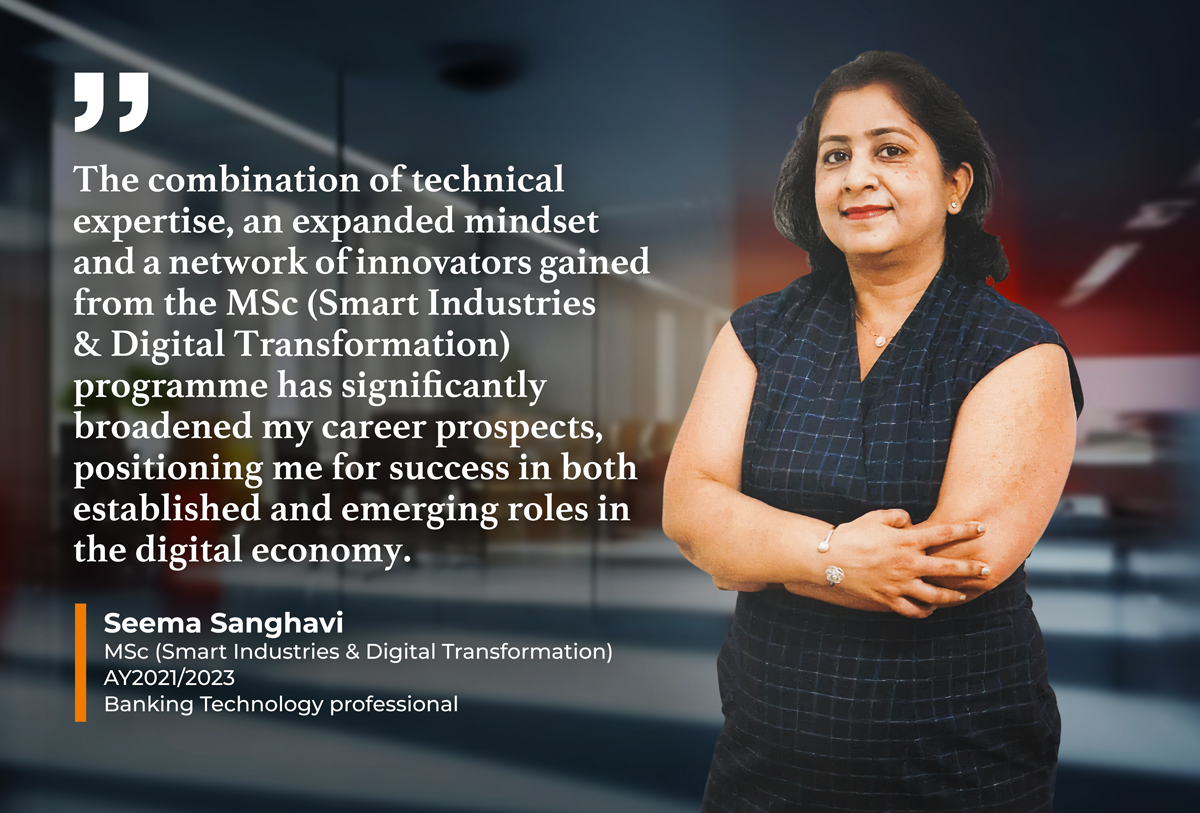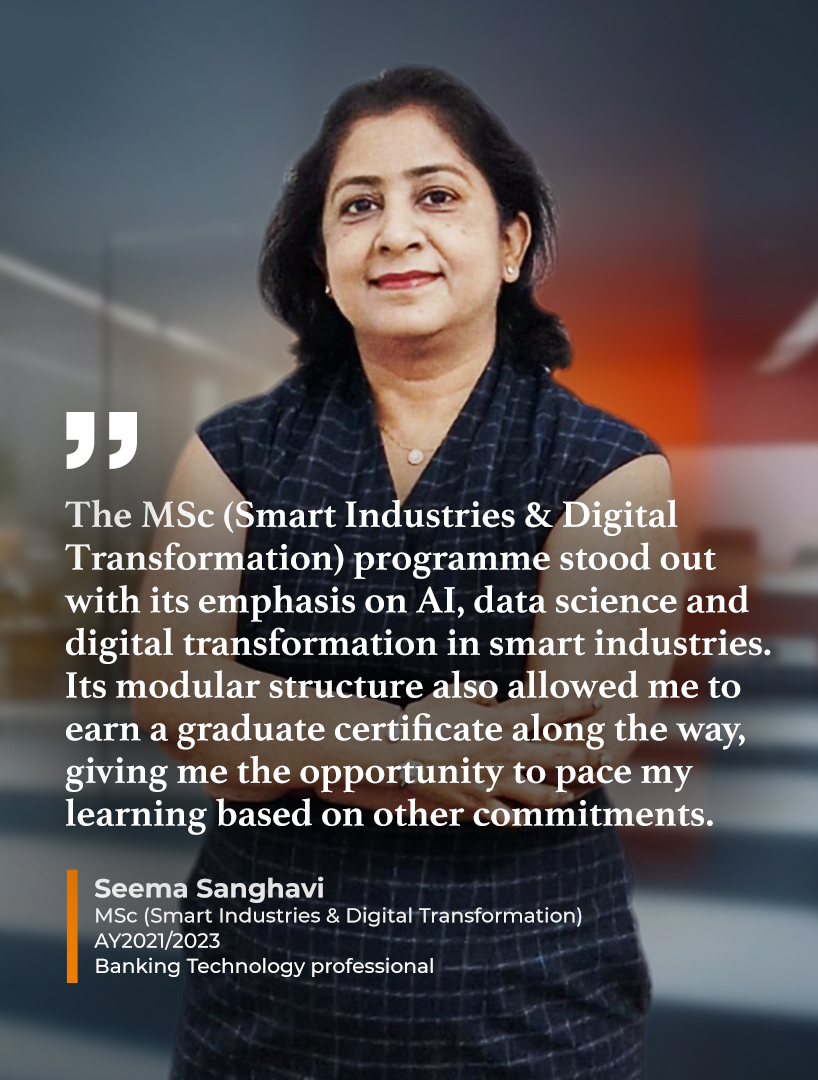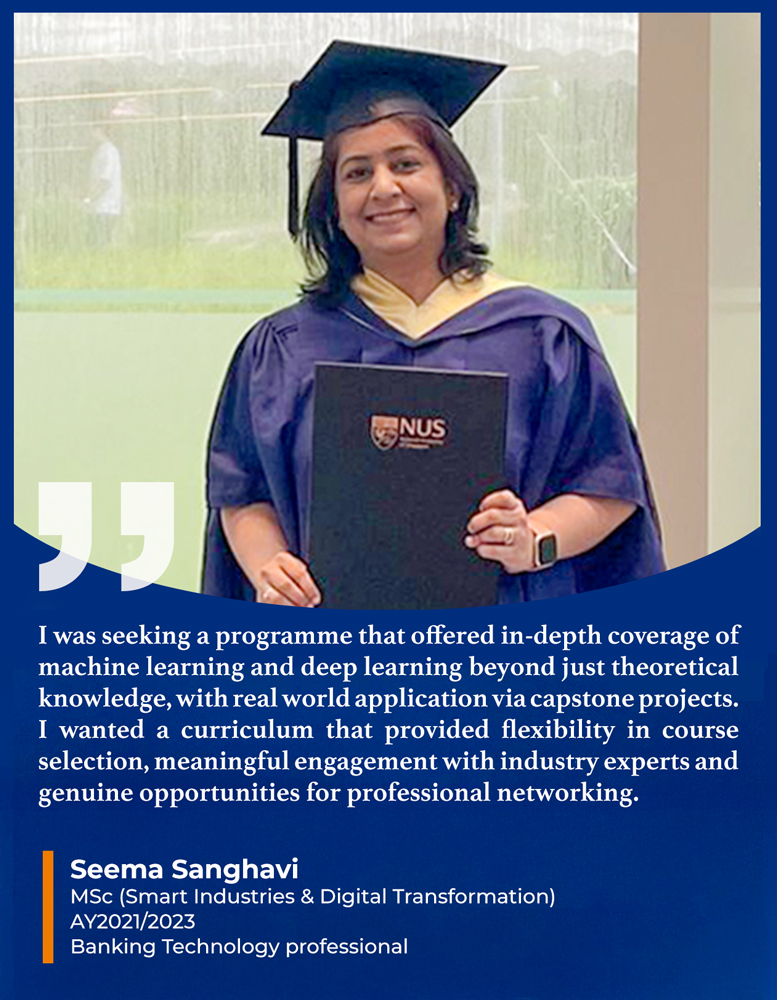
News & Stories
Latest News & Stories
Today we have the pleasure of sharing an article contributed by Seema Sanghavi. A graduate of the Master of Science (MSc) (Smart Industries and Digital Transformation), Seema is a twenty-year veteran of the banking technology sector who took up the programme in 2021 to — in her own words — “get aboard the AI train”.
The Start of Seema’s Story
I’m thrilled to have this opportunity to share my journey in the MSc (Smart Industries and Digital Transformation) programme — a journey that’s taken me from the bustling world of banking technology to the fascinating frontiers of deep learning and artificial intelligence (AI).
While I was well-anchored in my career, the pace of technological change sparked my desire to evolve further. At one point, I even considered pursuing a Financial Risk Manager certification or a MSc in Quantitative Finance, as those seemed like natural next steps. However, my perspective shifted dramatically after attending a networking event focused on machine learning and AI.
The atmosphere was electric, and the discussions revealed just how rapidly the future of banking—and technology in general—was evolving. I realised then that I needed to adapt to this accelerating trend or risk falling behind. That event ignited my interest in exploring advanced concepts in AI and deep learning. The ‘AI train’ was gaining momentum, and I knew it was time for me to get on board.
At that point, I began seeking a programme that offered in-depth coverage of machine learning and deep learning beyond just theoretical knowledge, with real world application via capstone projects. I wanted a curriculum that provided flexibility in course selection, meaningful engagement with industry experts and genuine opportunities for professional networking.

The Motivation: Why Go Back to School?
Some might wonder: why pursue a master’s degree after spending a long time in the industry? The answer is simple: the pace of technological advancement is relentless. I wanted to future-proof my skills and be part of the conversation shaping tomorrow’s banking landscape.
The NUS MSc (Smart Industries & Digital Transformation) programme stood out with its emphasis on AI, data science and digital transformation in smart industries. Its modular structure also allowed me to earn a graduate certificate along the way, giving me the opportunity to pace my learning based on other commitments.
Also, I was especially drawn to the programme’s hands-on approach. Real-world case studies, close collaboration with industry practitioners and a diverse cohort added significant depth to the experience. I also recognised that learning alongside professionals from diverse sectors would enhance understanding and foster new perspectives and innovative thinking.
The Early Days: Finding My Footing in Banking Technologies
When I started my career, the realm of banking technology looked very different. Back then, cloud computing was a buzzword and AI was something that existed only in science fiction. However, I dove headfirst into core banking systems, navigating through existing banking legacy platforms and helping my teams adapt to the digital wave sweeping through the industry.

I still remember my first major project. There were days when nothing worked, and nights were spent debugging code that refused to cooperate. However, every hurdle taught me something new about perseverance and creative problem-solving. I learned early that curiosity, adaptability and a strong support network — including mentors who believed in me — were vital ingredients for success.
Obstacles Along the Way
Re-entering formal education after years in the workforce was not without its challenges. Balancing a demanding full-time job, family responsibilities and academic commitments was one of the toughest parts of this journey. There were nights when neural networks and computer vision scripts danced through my mind — often not in the most pleasant ways! Imposter syndrome made occasional appearances, particularly when surrounded by classmates from diverse backgrounds — some were fresh out after completing their undergraduate studies, while others were established data science experts.
However, every challenge was a lesson in disguise. I learned to ask for help, to lean on my classmates for assistance and to celebrate small wins — like finally getting that object detection model to converge or presenting a project on money laundering detection that made sense to both engineers and business professionals.
Time management became my superpower. I learned to prioritise ruthlessly, delegate when possible, and carve out essential ‘me time’ to avoid burnout. There were moments of self-doubt, but I reminded myself that growth comes from stepping out of my comfort zone.
One of the toughest parts was balancing my identity as an experienced professional with the humility required to be a student again. I had to unlearn old habits and embrace new technologies. It was humbling but also incredibly rewarding.
What I’ve Learned (So Far)
My journey through the MSc (Smart Industries & Digital Transformation) programme has been transformative. I have gained a great deal, both professionally and personally. If I were to summarise the most important takeaways, they would be:
● Continuous learning is non-negotiable. Technology evolves relentlessly. Staying curious is the key to remaining relevant.
● Diversity drives Innovation. My banking experience gave me a unique lens on data and risk, while my classmates’ fresh perspectives kept me on my toes.
● Growth lives outside the comfort zone. It’s okay to be uncomfortable. “Challenging yourself — technically or personally — is a muscle to be worked. That’s when real transformation happens.”
● Collaboration and communication are essential. The best ideas often come from brainstorming sessions where everyone feels empowered to contribute. I also learned the importance of clear communication — translating complex technical concepts into language that the audience can understand, for example.
● Mentorship is valuable and bi-directional. I benefited from mentors throughout my career and now I aim to give back by supporting others, particularly women entering the technology space.

The future of digital banking is brimming with potential — from AI-driven financial recommendations to real-time fraud detection and inclusive global services.
The combination of technical expertise, an expanded mindset and a network of innovators gained from the MSc (Smart Industries & Digital Transformation) programme has significantly broadened my career prospects, positioning me for success in both established and emerging roles in the digital economy.
Videos

